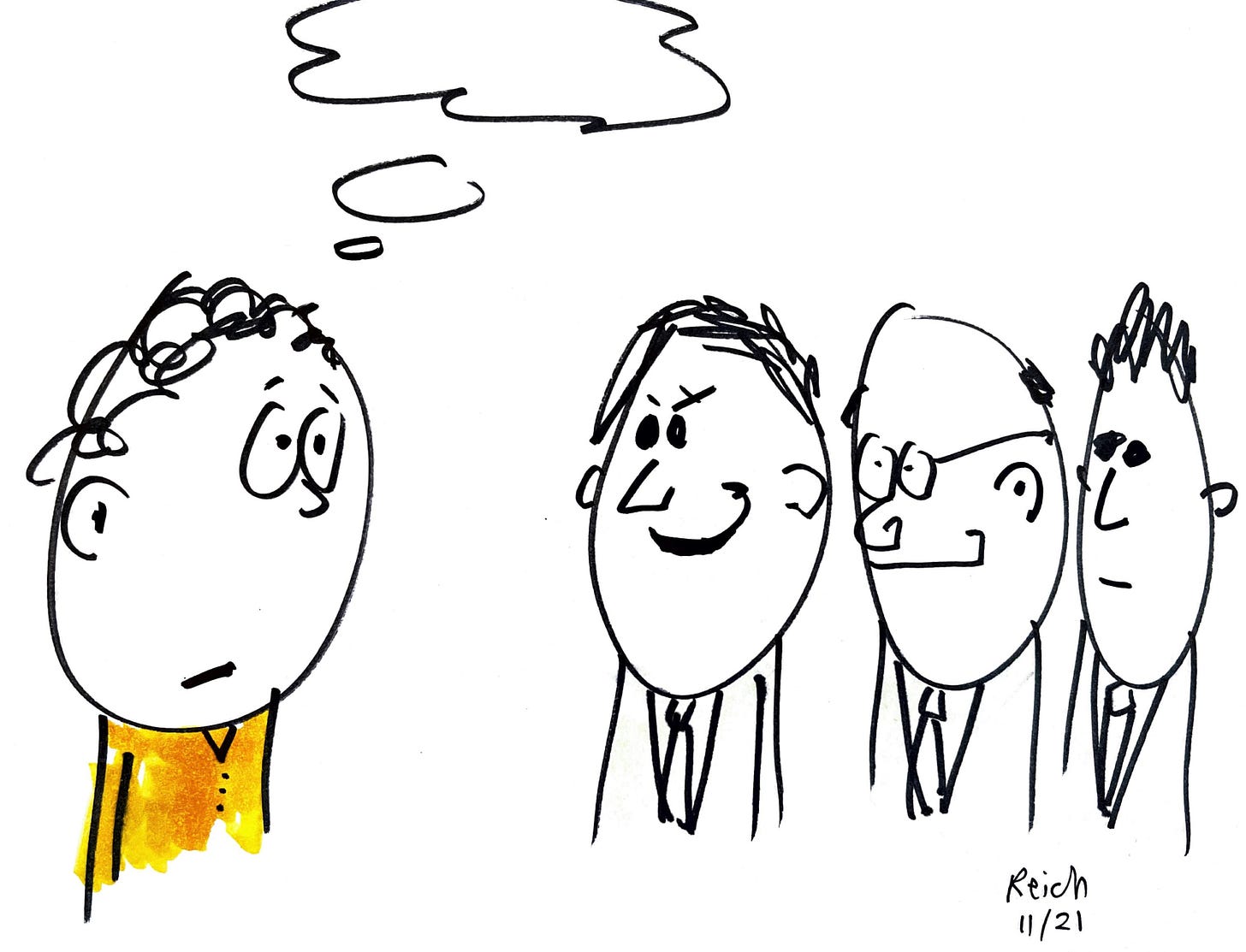It starts with a phone call from someone who says he’s been asked to investigate me, in case President-elect Clinton wants to appoint me to high office. He’s a bit vague about who actually made the request. I’m already getting used to sentences delivered in the passive voice (“We have been asked to …” “It is necessary that…” “There is a sense that …”) It’s the way people talk in Washington. The passive voice conveniently avoids any direct attribution of responsibility.
When I arrive at the investigator’s home, he offers me a drink and gets right to the point. He and two colleagues sit across from me, inquisition style. They are big men in gleaming starch-white shirts and dark suits.
“Our purpose is to discover any embarrassing item that might turn up in a confirmation hearing.” He smiles awkwardly.
“Anything I can do to help,” I chirp. “Nothing to hide here.” I laugh lamely.
Third grade. Ronny Elliott and I have sawed almost clear through the large maple that holds Richard Merrick’s tree house. Three fathers — mine, Ronny’s, and Richard’s — sit somberly in our living room. I’m grounded for a week.
“I expect this will be routine,” he says. “We’ve already done a preliminary check and you’re fine.”
“You’re pretty boring, as these things go,” says another member of the trio. They chuckle.
Miss Bouton’s Nursery School. I refuse to eat the bowl of mysterious mush she serves up for lunch. She asks me why. I tell her I’m not feeling well but that her food is delicious. She flies into a rage, telling me I’m a sarcastic brat, and expels me on the spot. Mother is devastated.
My host puts his drink down and looks at me intently. “We’re on your side,” he says. “We’re your team.” Silence. “If you can think of anything that, if revealed, might taint your confirmation, you probably should share it with us now.”
“Can’t think of anything.”
“The late nineteen-sixties? That’s a tricky period for some people.”
Oakland Induction Center, August 1969. I’m terrified. At four feet ten inches tall, I know I’m technically too short to be drafted, but I’ve heard rumors that the army is looking for tunnel rats small enough to flush the VC out from their caves. I’m standing in my underwear, back straight against the measure, when the examining sergeant issues his decision. “Sorry, son,” he says gravely. I’m too frightened to ask him whether he’s sorry I’m going to Nam or sorry I’m not. He continues, “Maybe someday you’ll grow, and then you can serve your country.”
“Nothing immediately comes to mind.”
“If it does, give us a call,” says my host, with a smile. “In the meantime, we do need to discuss this.”
He reaches under the coffee table and hands me a large black three-ring binder. “We did a computer search of all the negative things critics have written about your books over the years.”
It contains at least five hundred pages, single-spaced, indexed by year, cross-indexed by topic.
I hadn’t intended my books to be particularly provocative, but they turned out that way. Theological economists, committed to their own sacred beliefs, have been upset by them. Conservative theorists, bowing to their own gods, haven’t been particularly enthusiastic either. But the books have had some influence nonetheless. Even the President-elect is a fan, or so it seems. Every one of them sits on the bookshelf near his desk in the Governor’s Mansion. When he last visited Cambridge, he brought along a dog-eared copy of The Work of Nations, my most recent, filled with underlinings and marginal notes. Much of it found its way into his campaign book, “Putting People First.”
My host gently takes the binder out of my hands and places it on the coffee table between us. “Quite a collection,” he says, still smiling. “You’ll need to be ready to respond.” His two colleagues look at the volume, then up at me again, smiling politely and nodding in agreement.
“No problem,” I say. I try for humor: “And to think I accomplished all that in only fifteen years!” I laugh. The three of them continue to smile politely.
My host leans toward me. “You did much better than that.” He points to the label on the side of the black binder: Critics of Reich, Volume 1.




This wonderful and funny story makes me wonder if anyone goes through a serious background check today. It's hard to believe there is with some of the nut cakes in office. For readers out here, there's a lot more history like this in Robert Reich's book "Locked in the Cabinet," it really is a great read.
Thank you for sharing. I am so thankful your talents were not wasted on being a tunnel rat.